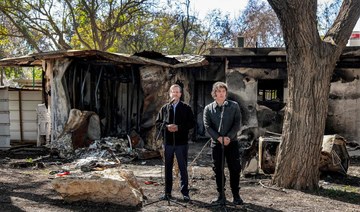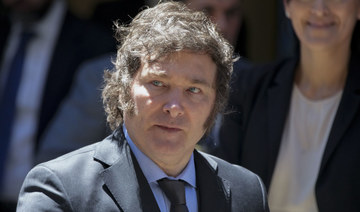BEIJING: Top US and Chinese diplomats appear to have had another sharply worded exchange, with Beijing saying it told the US to cease interfering in its internal affairs and accusing Washington of politicizing the search for the origin of the COVID-19 pandemic.
Senior Chinese foreign policy adviser Yang Jiechi and Secretary of State Antony Blinken held a phone call Friday that revealed wide divisions in a number of contentious areas, including the curtailing of freedoms in Hong Kong and the mass detention of Muslims in the northwestern Xinjiang region.
Calls for a more thorough investigation into the origin of the SARS-CoV-2 virus that causes COVID-19 are particularly sensitive for China because of suggestions that it might have Blinked escaped from a laboratory in the central city of Wuhan, where cases were first discovered.
Yang said China was “gravely concerned” over what he called “absurd” stories that the virus escaped from the Wuhan lab.
China “firmly opposes any despicable acts that use the epidemic as an excuse to slander China and to shift blames,” Yang was quoted as saying by the official Xinhua News Agency.
“Some people in the United States have fabricated and peddled absurd stories claiming Wuhan lab leak, which China is gravely concerned about,” Yang said. “China urges the United States to respect facts and science, refrain from politicizing COVID-19 origin tracing and concentrate on international anti-pandemic cooperation.”
The State Department said Blinken “stressed the importance of cooperation and transparency regarding the origin of the virus, including the need for (World Health Organization) Phase 2 expert-led studies in China.”
The US and others have accused China of failing to provide the raw data and access to sites that would allow a more thorough investigation into where the virus sprung from and how it initially spread.
Equally contentious were the issues of Hong Kong, Xinjiang, Taiwan and accusations that China has arbitrarily detained two Canadian citizens in retaliation for Canada’s arrest of an executive of Chinese communications technology giant Huawei, who is wanted by US law enforcement.
The US has “fabricated various lies about Xinjiang in an attempt to sabotage the stability and unity in Xinjiang, which confuse right and wrong and are extremely absurd. China is firmly opposed to such actions,” Yang said.
“Hong Kong affairs are purely China’s internal affairs,” and those found in violation of a sweeping national security law imposed on the former British colony “must be punished,” Yang said.
Blinken, on the other hand, underscored US concern over the deterioration of democratic norms in Hong Kong and the ongoing “genocide and crimes against humanity against predominantly Muslim Uyghurs and members of other ethnic and religious minority groups in Xinjiang,” the State Department said.
He also urged Beijing to ease pressure against Taiwan, the self-governing island democracy China claims as its own territory, to be annexed by force if necessary.
According to Xinhua, Yang said Taiwan involves China’s “core interests” and that Beijing “firmly defends its national sovereignty and territorial integrity.”
The tone of the phone call seemed to echo contentious talks in March in Alaska, when the sides traded sharp and unusually public barbs over vastly different views of each other and the world in their first face-to-face meeting since President Joe Biden took office.
At that meeting, the US accused the Chinese delegation of “grandstanding,” while Beijing fired back, saying there was a “strong smell of gunpowder and drama” that was entirely the fault of the Americans.
Relations between them have deteriorated to their lowest level in decades, with the Biden administration showing no signs of deviating from the established US hard-line against China over trade, technology, human rights and China’s claim to the South China Sea.
Beijing, meanwhile, has fought back doggedly against what it sees as attempts to smear its reputation and restrain its development.
On Thursday, its ceremonial legislature passed a law to retaliate against sanctions imposed on Chinese politicians and organizations, threatening to deny entry to and freeze the Chinese assets of anyone who formulates or implements such measures, potentially placing new pressure on foreign companies operating in the country.
China, US diplomats clash over human rights, COVID-19 pandemic origin
https://arab.news/5z6h7
China, US diplomats clash over human rights, COVID-19 pandemic origin

- Calls for a more thorough investigation into the origin of the SARS-CoV-2 virus that causes COVID-19 are particularly sensitive for China
Austria to resume aid to UN agency for Palestinians
Israel alleged in January that some United Nations Relief and Works Agency (UNRWA) employees may have participated in the Hamas attacks on October 7 that triggered the war in the Gaza Strip.
In the weeks that followed, numerous donor states, including Austria, suspended or paused some $450 million in funding.
Many, including Germany, Sweden, Canada and Japan, had since resumed funding, while others have continued to hold out.
“After analizing the action plan in detail” submitted by UNRWA “to improve the functioning of the organization,” Austria has decided to “release the funds,” its foreign ministry said in a statement.
A total of 3.4 million euros ($3.7 million) in funds have been budgeted for 2024, and the first payment is expected to be made in the summer, the statement said.
“Some of the Austrian funds will be used in the future to improve internal control mechanisms at UNRWA,” it added.
Austria said it will “closely monitor” the implementation of the action plan with other international partners, noting that “a lot of trust had been squandered.”
The Alpine country said it has substantially increased support for the suffering Palestinian population in Gaza and the region since 7 October, making 32 million euros ($34.8 million) in humanitarian aid available to other international aid organizations.
The Hamas attack on October 7 resulted in the death of more than 1,170 people in Israel, most of them civilians, according to an AFP tally based on official Israeli figures.
Israel’s campaign in Gaza has since killed at least 35,303 people, also mostly civilians, according to data provided by the health ministry in the Hamas-run territory.
Flash floods kill at least 50 people in western Afghanistan

- Death toll was based on preliminary reports and might rise
- Hard-hit province of Ghor has suffered significant financial losses
ISLAMABAD: Flash floods from heavy seasonal rains in western Afghanistan have killed at least 50 people and dozens remain missing, a Taliban official said on Saturday, adding the death toll was based on preliminary reports and might rise.
Afghanistan has been witnessing unusually heavy seasonal rains.
The hard-hit province of Ghor has suffered significant financial losses, said Abdul Wahid Hamas, spokesman for the provincial governor, after thousands of homes and properties were damaged and hundreds of hectares of agricultural land destroyed following Friday’s floods, including the capital city Feroz Koh.
The Taliban’s government chief spokesman posted on social platform X, mourning “the loss of our fellow Afghans,” and urged ” responsible authorities ... to provide all necessary support to alleviate the suffering.” He also called on “our benevolent donors” to help and humanitarian organizations to provide the affected communities with aid.
Last week, the UN food agency said the exceptionally heavy rains in Afghanistan have killed more than 300 people and destroyed thousands of houses, mostly in the northern province of Baghlan, which bore the brunt of floods on May 10th.
Survivors have been left with no home, no land, and no source of livelihood, the World Food Organization said. Most of Baghlan is “inaccessible by trucks,” said WFP, adding that it is resorting to every alternative it can think of to deliver food to the survivors.
The latest disaster came on the heels of devastating floods that killed at least 70 people in April. The waters also destroyed about 2,000 homes, three mosques and four schools in western Farah and Herat, and southern Zabul and Kandahar provinces.
Nearly 10,000 evacuated in Ukraine’s Kharkiv region: governor

- Ukrainian President Volodymyr Zelensky plays down Russia’s gains in the offensive
- Moscow has been attacking several settlements including Vovchansk, just five kilometers from the border
KYIV: Nearly 10,000 people have been forced to leave their homes in Ukraine’s northeastern Kharkiv region since a ground attack launched by Russian forces on May 10, the regional governor said.
The assault may only be the first wave of a wider offensive, Ukrainian President Volodymyr Zelensky said.
Over a week after its launch, “a total of 9,907 people have been evacuated,” governor Oleg Synegubov said.
They were fleeing Russian soldiers who managed to advance between five to 10 kilometers (three to six miles) along the northeastern border before being stopped by Ukrainian forces.
Synegubov said Ukraine’s armed forces had repelled two attempts to break through defenses overnight.
The situation was “under control” with “defenders in certain areas conducting assault... and combing operations.”
Moscow has been attacking several settlements including Vovchansk, just five kilometers from the border.
“In the area of the city of Vovchansk, Ukrainian troops are reinforcing their defense,” Synegubov said.
A day earlier, he said Russian forces have started to destroy Vovchansk and all but 200 of its residents have fled due to fighting.
Russian forces have taken 278 square kilometers (107 square miles) between May 9 and 15, their biggest gains since the end of 2022, AFP calculated using data from the Institute for the Study of War (ISW).
Russia’s offensive “could consist in several waves. There was the first wave” in the Kharkiv region, Zelensky said journalists.
Zelensky played down Russia’s gains in the offensive but added: “We have to be sober and understand that they are going deeper into our territory. Not vice versa. And that’s still their advantage.”
Speaking about the offensive during a visit to China on Friday, Russian President Vladimir Putin said it was a response to Ukraine shelling border regions.
Nepal latest to ban Indian spice brands over safety concerns

- Hong Kong, Singapore last month banned products from Everest and MDH after tests detected presence of ethylene oxide
- Besides its use as a pesticide, ethylene oxide is used to sterilize medical equipment and as a sterilising agent in spices
KATMANDU: Nepal has become the latest jurisdiction to ban the import and sale of two popular Indian spice brands after reports that some of their products contained a cancer-causing pesticide, officials said Friday.
Hong Kong and Singapore last month banned products from Everest and MDH — two brands popular in India and exported worldwide — after tests detected the presence of ethylene oxide, according to media reports.
Besides its use as a pesticide, ethylene oxide is used to sterilize medical equipment and as a sterilising agent in spices to prevent illnesses caused by salmonella and E. Coli bacteria.
Regular exposure to the colorless and odourless compound increases the “risk of cancers of the white blood cells,” according to the US Environmental Protection Agency.
Matina Joshi Vaidya, chief of Nepal’s Department of Food Technology and Quality Control, told AFP that the Himalayan country had also decided to halt the sale of the spice blends.
“It is an issue of public health,” she said. “We have its banned import and sale from Thursday.”
Nepal has banned four products — three variants produced by MDH and one by Everest.
“We do not have the lab resources to run the tests in the country. The ban will be lifted when Indian authorities declare it safe,” Vaidya said.
Everest and MDH are India’s top two spice brands with a market share of 16 and 10 percent respectively in 2022, according to consumer research monitor Statista.
Both companies have put out statements denying their products pose a health hazard to consumers after the Singapore and Hong Kong import bans.
“We clarify and state unequivocally that these claims are untrue and lack any substantiating evidence,” MDH said last month on social media platform X.
India’s food regulation agency has asked for state authorities to carry out random testing of spice products, broadcaster NDTV reported.
Argentine president begins unusual visit to Spain, snubbing officials and courting the far-right

- The brash President Javier Milei has no plans to meet Spain's PM — nor any other government official
- He will instead attend a far-right summit Sunday hosted by Sánchez’s fiercest political opponent, the Vox party
BUENOS AIRES, Argentina: Even before kicking off a three-day visit to Madrid on Friday, Argentina’s libertarian President Javier Milei stirred controversy, accusing the socialist government of bringing “poverty and death” to Spain and weighing in on corruption allegations against the prime minister’s wife.
In such circumstances, a typical visiting head of state may strive to mend fences with diplomacy.
Not Milei. The brash economist has no plans to meet Spanish Prime Minister Pedro Sánchez during his three days in the Spanish capital — nor the Spanish king, nor any other government official. Instead, he’ll attend a far-right summit Sunday hosted by Sánchez’s fiercest political opponent, the Vox party.
The unorthodox visit was business as usual for Milei, a darling of the global far right who has bonded with tech billionaire Elon Musk and praised former US President Donald Trump. Earlier this year on a trip to the United States, Milei steered clear of the White House and took the stage at the Conservative Political Action Conference, or CPAC, where he railed against abortion and socialism and shared a bear hug with Trump.
Milei presented his 2022 book, “The Way of the Libertarian,” in Madrid Friday at a literary event organized by La Razón, a conservative Spanish newspaper.
The book — withdrawn from circulation in Spain earlier this month because the back-flap biography erroneously said Milei had earned a doctorate — traces his meteoric rise in politics from eccentric TV personality to national lawmaker and outlines his radical free-market economic ideas.
To thunderous applause, Milei condemned socialism as “an intellectual fraud and a horror in human terms.”
“The good thing is that the spotlight is shining on us everywhere and we are making the reds (leftists) uncomfortable all over the world,” Milei said.
He took the opportunity to promote the results of his harsh austerity campaign in Argentina, celebrating a decline in monthly inflation in April though making no mention of the Buenos Aires subway fares that more than tripled overnight.
Repeating a campaign pledge to eliminate Argentina’s central bank — without giving further details — Milei promised to make Argentina “the country with the most economic freedom in the world.”
At the event Milei gave a huge hug to his ideological ally Santiago Abascal, the leader of the hard-right Vox party and the only politician with whom Milei has actual plans to meet in Madrid.
The Vox summit Sunday seeks to bring together far-right figures from across Europe in a bid to rally the party’s base ahead of European parliamentary elections in June. Milei described his attendance a “moral imperative.” He also has plans to meet Spanish business executives Saturday.
Tensions between Milei and Sánchez have simmered since the moment the Spanish prime minister declined to congratulate the libertarian economist on his shock election victory last November.
But hostility exploded earlier this month when one of Sánchez’s ministers suggested Milei had taken narcotics. The Argentine presidency responded with an unusually harsh official statement accusing Sánchez’s government of “endangering the middle class with its socialist policies that bring nothing but poverty and death.”
The lengthy government statement also accused Sánchez of having “more important problems to deal with, such as the corruption accusations against his wife.”
The allegations of influence peddling and corruption brought by a right-wing group against Sánchez’s wife, Begoña Gómez, had prompted Sánchez, one of Europe’s longest serving Socialist leaders, to consider stepping down.


















